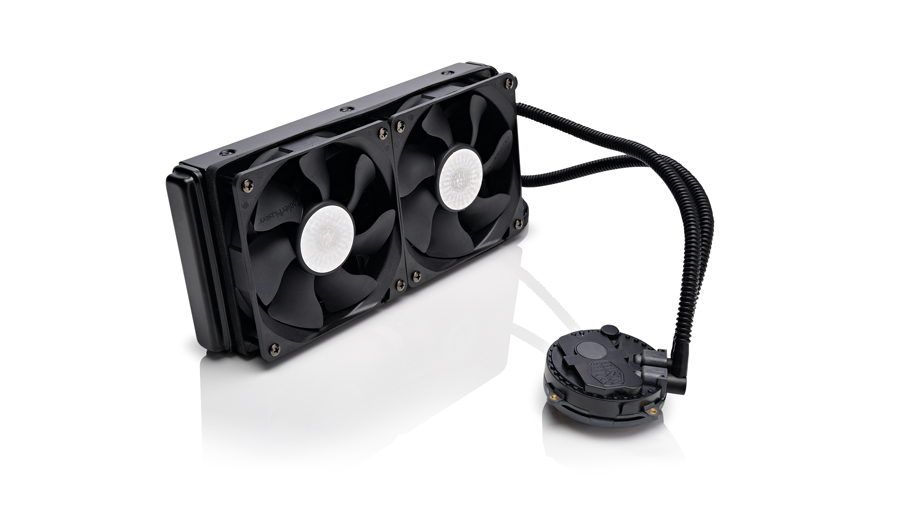TechRadar Verdict
Pros
- +
Good cooling performance
- +
Well designed mounting bracket
- +
Cable management
Cons
- -
Noise at default settings
- -
No control via USB or quick switches
Why you can trust TechRadar
They all look the same. That's the danger with the factory-sealed, ready-to-roll water-cooling kits such as the Cooler Master Seidon 240M. Superficially, it feels like a choice between single and dual-fan radiators with only a matter of price separating the two.
Fight the urge though, because there are subtle differences and a lot depends on what you want from a water-cooling system and how you plan to use it. Outright cooling prowess, noise levels - for the most part it's pretty homogeneous. It's when you're doing something other than simply sitting there with your CPU cores maxed out that you find out what really matters.
In terms of architecture, the Cooler Master Seidon 240M is a 240mm radiator cooled by a pair of 120mm fans. There's a large copper CPU block -with what Cooler Master describes as "UltraFine Micro Channels", which maximises coolant contact with the cold plate.
The CPU block looks like a custom Cooler Master design, rather than one of the generic blocks you find in most kits. In terms of setup and fitting, the Seidon 240M falls in the middle of the batting order. However, the instruction manual is kind of flaky, and getting it fitted to an LGA2011 board can be a bit of a faff, too.
Swap shop
For the LGA1155 socket, things are a bit more straightforward - the good news is that the Seidon 240M is one of those systems that use screw-on posts to secure the backing plate to the motherboard. The relevance of this comes when you start swapping CPUs. It means you only need access to the rear of the motherboard first time round. After that, you can get the CPU swap job done entirely from above.
That process isn't quite a slick and easy as the very best (like our long-term test rig cooler, the Corsair H100) but it's exponentially easier than Enermax's ELC240, where the backing plate basically drops off when you release the cooling block.
Benchmarks
Intel Core i7 3770K at standard clocks
CPU idle: Degrees centigrade: Lower is better
ENERMAX ELC240: 30
COOLER MASTER SEIDON 240M: 29
Intel Core i7 3770K at standard clocks
Full CPU load: Degrees centigrade: Lower is better
ENERMAX ELC240: 44
COOLER MASTER SEIDON 240M: 45
Intel Core i7 3770K overclocked to 4.7GHz
Full CPU load: Degrees centigrade: Lower is better
ENERMAX ELC240: 58
COOLER MASTER SEIDON 240M: 58
As for other features, the Seidon 240M scores points for attention to detail courtesy of a rubber noise-dampening gasket that sits between the fans and the rad - even if we're not totally convinced it makes that much difference.
Cable management is well executed, too. It's two-into-one for the fans, with a separate cable for the water pump; depending on your motherboard, that'll give you independent control of the fans and the pump.
What you don't get is digital control via USB or physical quick switches on the hardware itself. If you want to tweak the fan or pump speeds, you'll be doing that via your motherboard BIOS.
Of course, many mobos come with Windows utilities, so you may be able to tweak the Seidon 240M from within the OS. At default settings, noise levels under full CPU load are just a bit intrusive, so it may be worth knocking the fan settings down a notch or two.
Technology and cars. Increasingly the twain shall meet. Which is handy, because Jeremy (Twitter) is addicted to both. Long-time tech journalist, former editor of iCar magazine and incumbent car guru for T3 magazine, Jeremy reckons in-car technology is about to go thermonuclear. No, not exploding cars. That would be silly. And dangerous. But rather an explosive period of unprecedented innovation. Enjoy the ride.
